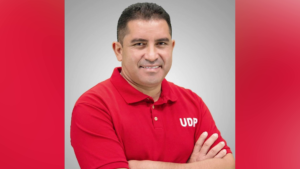Challenges in Reforming from Gang Life
According to research conducted by Doctor Harold Young in 2019, there are as many as fourteen hundred active gang members in Belize City. These groups of young men prey on each other often in a struggle for turf in the illegal drug trade. The wanton violence has seen deadly shootings in broad daylight when gang members are caught straying out of their neighborhoods. Since they have become part of our reality, the streets have not been as safe as they once were. These young men, many of them unemployed, use their fraternity to also target regular civilians to rob, commit home invasions, assault, and murder. In this edition of our Five Point Breakdown, News Five’s Marion Ali looks at gangs, why people join them, and intervention programs to guide other youths away before they are led astray. Here’s that report.
Marion Ali, Reporting

In the Old Capital, a murder scene usually means the work of a gang taking revenge on a rival street gang for a previous killing or shooting. It has been this way since the mid-nineties when the original Bloods and Crips gangs were formed. The rivalry between the two made certain streets at certain hours more dangerous to walk. But what are street gangs in the first place?
What Are Street Gangs?
A street gang is defined as a group of persons who repeatedly engage in criminal activities that impact the order and safety of public places in particular. But why do men and youths join gangs?
Why Do People Join Gangs?

Brandon Baptist
Brandon Baptist, Gang Member
“I deh pahn the street for quite some while, I get caught up in the jail a lot of times. I was with the police. I always deh pahn news. Everybody knows me, Brandon Baptist, right?”

Karl Augustine
Karl Augustine, Belize City Resident
“When I was 16 years old, because of poverty and lack of leadership and, you know, I didn’t have that father figure in my life. So, you know, I ended up on the street. One of my friends, um, he passed away by gang violence.”
Karl Augustine says he was never a member of any gang, but the life he led as a youth created the same impact for him. And as Baptist alluded to, his time with the gang led him to incarceration. Now, both men are trying to turn around their lives.
 Karl Augustine
Karl Augustine
“I decided to leave that lifestyle behind and I joined the volunteer BDF. And from the volunteer BDF, I spent like two years in the volunteer BDF and then joined the regular force. And, during my time in the regular force, um, there was different options because it’s just not being only a soldier. Also, they give you like different opportunities to become a mechanic or electrician. So, um, they asked me if I wanted to take a trade, so I picked the trade. And that’s how I learned about electricity.”
Difficulties in Leaving
Sometimes it’s difficult to leave.
 Marion Ali
Marion Ali
“Did you get threats, things like that?”
Timmy Stamp
“Yes, yoh get threats. They threaten yoh and different things like that.”
 Brandon Baptist
Brandon Baptist
“Every time I try to do something positive, I fall back. But I still fight it.”
Marion Ali
There are a few individuals who have joined street gangs and have left successfully. The next person we spoke with shared his testimony of a life of crime and violence. Fifty-seven-year-old Timmy Stamp joined the KGB Bloods in the early nineties. For him it took family life to take him away from the streets.

Timmy Stamp
Timmy Stamp, Former Gang Member
“We that we start this. make it get big like this. Yeah, we totally start it. You because I was in blood. We was KGB. I thank God that I don’t have to kill nobody. You know what I mean? Um, yeah, Rob, you name it. We gone through it. You know what I mean? But otherwise we don’t have to kill nobody. And I thank God for that. You know what?
Marion Ali
“What eventually opened your eyes for you to decide, you know what, this enough for me and I have to exit.”
 Timmy Stamp
Timmy Stamp
“Well, my beautiful wife when I meet she done like, you know, I wanted to take her out to different places and can’t ker she no way. And I cyant go no way.. Then I have a new daughter and different things that I want to do better today. You know something. So therefore I ask God like change my lifestyle and you know, get me away from this.”
Stamp opened his own business, first a fruit shop, which transitioned into a grocery shop he now owns on Dean Street. He showed us scars he suffered while in the gang. To help steer tomorrow’s leaders away from that path and worse possible outcomes, he conducts evening sessions and has field trips for children from the area.
 Timmy Stamp
Timmy Stamp
“We have evening classes that we do with them, you know, teach them to read, spell, math, and things like that. We get up on different trips, you know, just make them know their country beliefs, you know, I think we need more things like dende.”
The Role of Intervention Programs
Stamp and other community leaders get support from the Leadership Intervention Unit, headed by Dominique Norales.

Dominique Norales
Dominique Norales, Chair, L.I.U
“You have Mr. Timmy Stamp who runs after school program. You have Stix who runs Days of Healing. Miss Olga who runs an after-school program in her front yard. Um, other, other community groups, neighborhood watch groups who have, um, really been doing that nuanced work that we, we can’t have, we can’t do.”
The L.I.U works with various organizations, agencies, institutions and units to divert troubled or at-risk youths through channels that can help improve their lives.
 Dominique Norales
Dominique Norales
“That work, first, you know, involves collecting some information on them, um, the neighborhoods they come from, and children they have. When they would have dropped out of school, which is a situation most of them have gone through for several reasons. And then we, um, put them on work teams, which are based in different parts of Belize City. That work is supported by the Belize City Council, where we try to coordinate, um, what sort of beautification work needs to be done in communities. Appended to the work program is also the TOBAL vocational training, um, that we engage our clients in. Um, so some of them are enrolled in school as well, which happens two times a week, um, every week for three to four months depending on holidays and stuff like that. And then those persons by and large are also engaged in other trainings.”
It is trainings like this that Brandon Baptist and Karl Augustine are also engaging youths in the Lake Independence Area in, to ensure that most of their waking hours are spent in positive activities. Augustine, who is a BDF soldier, says their background in electrical work complimented the program he wanted to manage.
 Karl Augustine
Karl Augustine
“A lot of people think that. People from the Lake Independence are just criminals, or when people heard about um, Lake High, or St. Martin era, people would think that, it’s just violence people, but it’s nothing like that. You know, there’s actually good people here, and people who are willing to help other people, and willing to change their life, if people would have given them the opportunity to do so. Some of the trainees. Come up to me and they tell me, Mr. Carl, look man, my phone got, the wire got damaged and the skill that, the way that you show me how to connect the wires together, it’s the same thing that I did and the phone started to work.”
 Brandon Baptist
Brandon Baptist
“They got a lot of youth there, you know, they go to school, a lot of youth where they try out there, and then they end up in a gang world or da violent world soh we have to stop that before that happen then soh wi give them wa opportunity fi come learn a lee trade.”
Making The Bold Step Out
Dominique Norales says the L.I.U also works with youths who slip and with gang members who walk and show that they really want reform. For those who want change like Stamp did thirty seven-years ago, the challenges will be there but faith rules everything.
Timmy Stamp
“Remember da God run things, nuh deh. Da God run things. I just put all my faith and my trust in God.”
Marion Ali for News Five.







Facebook Comments